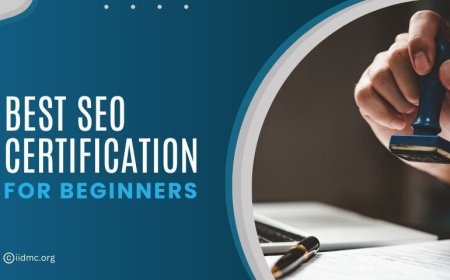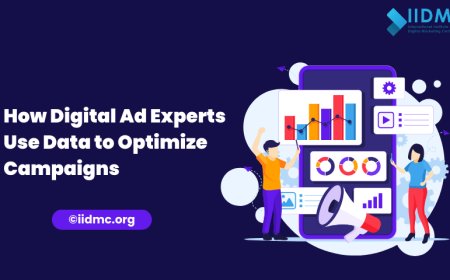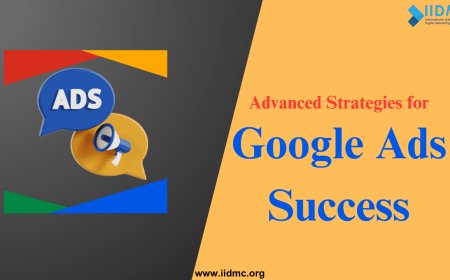Key Digital Marketing Modules to Learn
Unlock the potential of your marketing career by exploring the key digital marketing modules to learn. From SEO and content marketing to social media strategies and analytics, this guide covers essential skills that will help you thrive in the digital landscape. .
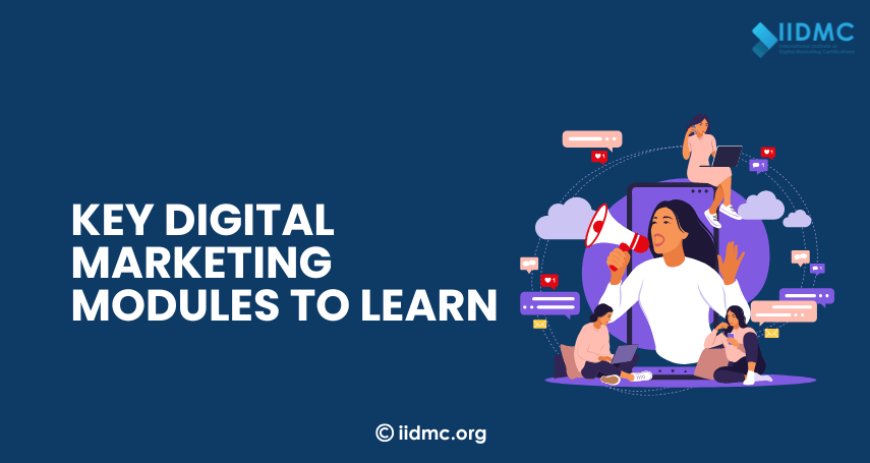
Digital marketing has transformed how businesses connect with their audiences. Understanding digital marketing modules is valuable as they help companies to the complex online, allowing them to engage effectively with consumers. These modules encompass key strategies like search engine optimization (SEO), social media marketing, email marketing, and content creation. Each strategy is essential for building brand recognition, engaging customer relationships, and driving business growth.
The fundamentals of digital marketing are critical for developing effective strategies in a competitive world. It involves more than just using online tools; it requires an understanding of the key elements that lead to successful campaigns. This includes identifying target audiences and data insights, creating engaging content, and ensuring a smooth user experience. When businesses recognize how these components work together, they can create campaigns that resonate with their audience, enhance their brand, and deliver measurable results. Mastering these foundational concepts is crucial for success in the ever-evolving of digital marketing.
Importance of Digital Marketing
-
Reach a Larger Audience: Digital marketing allows businesses to connect with customers worldwide. This means they can find new customers in different countries and cultures, expanding their market like never before.
-
Measure Performance: One of the best parts of digital marketing is the ability to track how well campaigns are doing. Businesses can use various tools to see which ads are working and which ones need improvement. This helps them make smart decisions and adjust their strategies quickly.
-
Cost-Effective: Digital marketing can be more affordable than traditional advertising, like TV or print ads. This is great news for small businesses that may have limited budgets. They can use social media, email marketing, and search engine optimization (SEO) to promote themselves without breaking the bank.
-
Build Relationships: Engaging with customers through digital channels helps create a bond. When businesses respond to comments, share valuable content, or offer personalized messages, customers feel valued. This loyalty can lead to repeat business and positive word-of-mouth referrals.
-
Stay Competitive: having a strong online presence is essential for keeping updated. Businesses that accept digital marketing can stay ahead of their competitors who may still on traditional methods. By using online tools and platforms, they can showcase their products and services effectively.
-
Target Specific Audiences: Digital marketing allows businesses to target specific groups of people based on their interests, demographics, and online behavior. This means they can create tailored messages that resonate with the right audience, increasing the chances of success.
-
Adapt to Trends: The digital marketing strategy is always changing. With digital marketing, businesses can quickly adapt to new trends and consumer preferences. This flexibility helps them stay relevant and meet the evolving needs of their customers.
Modules in Digital Marketing
-
Search Engine Optimization (SEO): SEO is all about making websites better so they show up higher on search engines like Google. When a website ranks well, it gets more visitors, which can lead to more sales or sign-ups. Learning SEO techniques helps businesses attract the right audience by using keywords, improving site speed, and creating quality content.
-
Social Media Management: This module teaches how to use social media platforms like Facebook, Instagram, and Twitter to connect with customers. Effective social media management means regularly posting engaging content, responding to comments, and running promotions. This builds brand awareness and creates a community around the brand, making customers feel more connected.
-
Content Marketing: Content marketing is about creating valuable and relevant content that attracts and keeps customers interested. This can include blog posts, videos, podcasts, or infographics. Good content provides useful information, solves problems, or entertains, which helps build trust. When customers see the value, they are more likely to engage with the brand.
-
Email Marketing: Email marketing is a direct way to communicate with customers. It involves sending newsletters, promotional offers, or personalized messages to subscribers. Learning how to create eye-catching subject lines and valuable content can increase open rates and conversions, helping businesses maintain strong relationships with their audience.
-
Analytics: Analytics is about gathering and analyzing data to see how marketing efforts are performing. This includes looking at website traffic, social media engagement, and email open rates. By understanding what works and what doesn’t, businesses can make smarter decisions and adjust their strategies to improve results over time.
-
Digital Advertising: This module focuses on paid advertising strategies, such as Google Ads and social media ads. Learning how to create effective advertisements involves understanding target audiences, setting budgets, and measuring success. Good digital advertising can significantly increase a business’s visibility and sales, making it an essential skill in digital marketing.
-
Affiliate marketing: is a popular digital marketing strategy where individuals promote other companies products or services and earn a commission for every sale or lead generated through their unique links. This approach is appealing because it involves low risk—marketers don’t need to create or manage products themselves. It can also be a great source of passive income when implemented effectively. The flexibility of affiliate marketing makes it attractive to freelancers and those looking to earn money online from anywhere. By mastering affiliate marketing, marketers can open up new revenue opportunities while expanding their digital marketing.
-
Search Engine Marketing (SEM): is a digital marketing strategy that uses paid ads to increase a website’s visibility on search engine results pages. Unlike SEO, which focuses on organic rankings, SEM involves creating pay-per-click (PPC) campaigns that appear at the top of search results when users search for specific keywords. This allows businesses to attract targeted traffic quickly and effectively. SEM provides the advantage of delivering immediate results and highly targeted advertising, making it a valuable tool for reaching the right audience and maximizing return on investment
Roles and Responsibilities in Digital Marketing
-
Digital Marketing Manager: The digital marketing manager is in charge of planning and overseeing online marketing campaigns. They create strategies to promote products or services, manage the marketing team, and ensure that all campaigns run smoothly. They also track the results to see if the campaigns are working and adjust the plans when needed.
-
SEO Specialist: SEO specialist focuses on improving a website's ranking on search engines like Google. They use keywords, optimize web pages, and follow search engine guidelines to help websites appear higher in search results. The goal is to get more visitors to the website, which can lead to more customers.
-
Content Creator: A content creator develops engaging and valuable material for websites, blogs, and social media. This can include writing articles, creating videos, designing infographics, or recording podcasts. Their job is to create content that grabs attention and encourages customers to learn more about the brand or product.
-
Social Media Manager: The social media manager handles a company’s social media profiles on platforms like Facebook, Instagram, Twitter, and LinkedIn. They post updates, respond to customer comments, and create strategies to grow the brand’s online presence. A big part of their role is to engage with the audience and keep them interested in the brand.
-
Data Analyst: A data analyst studies data from different marketing channels to understand how well marketing efforts are performing. They look at numbers such as website traffic, social media engagement, and email response rates. This helps the marketing team see what’s working and what needs improvement, so they can make better decisions in the future.
-
PPC (Pay-Per-Click) Specialist: A PPC specialist manages paid advertising campaigns, such as Google Ads. They create and optimize ads to ensure they reach the right audience and generate clicks or sales. Their role includes setting budgets, choosing keywords, and tracking the performance of the ads to maximize the return on investment.
-
Email Marketing Specialist: An email marketing specialist creates and manages email campaigns to reach out to potential and current customers. They craft newsletters, promotional emails, and personalized messages that encourage customers to engage with the brand. Their main goal is to build long-lasting relationships through regular, valuable communication.
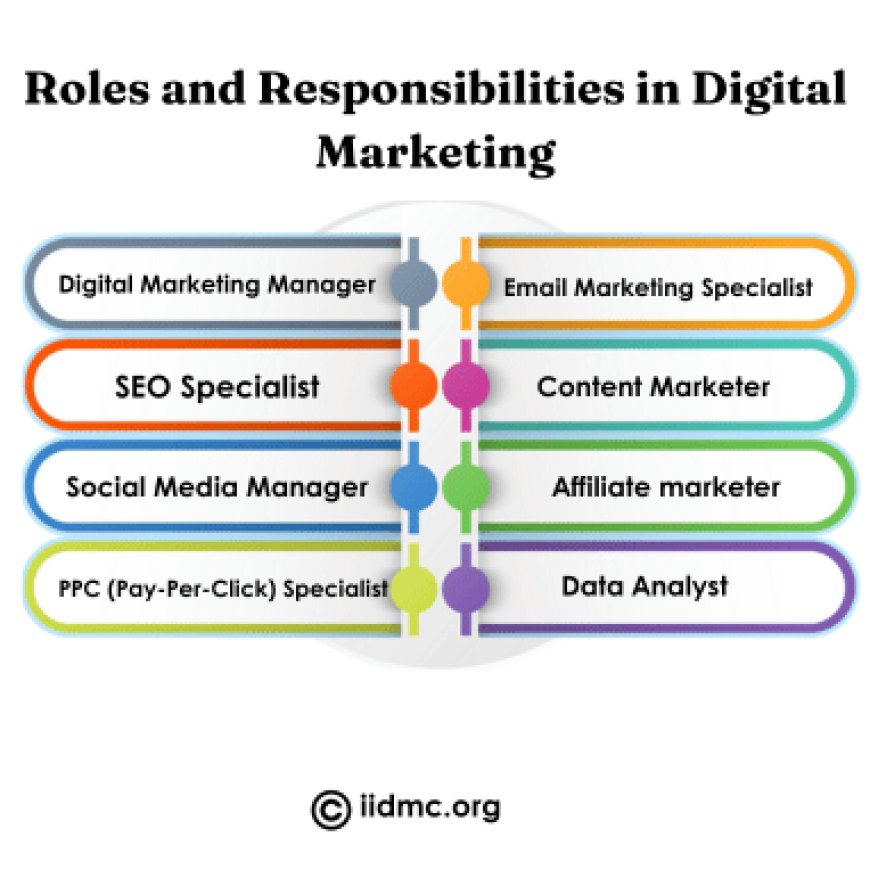
IIDMC Certifications in Digital Marketing
The International Institute of Digital Marketing Certification (IIDMC) offers a range of certifications that help professionals build their digital marketing skills. These certifications are recognized globally and cover essential areas of digital marketing. Here are some key IIDMC certifications:
-
Certified Digital Marketing Professional (CDMP): This certification provides a comprehensive understanding of digital marketing strategies, including SEO, social media marketing, and email marketing. It's ideal for those who want to manage digital campaigns and improve their overall marketing skills.
-
Certified Social Media Marketing Professional (CSMMP): This certification focuses on social media platforms like Facebook, Instagram, Twitter, and LinkedIn. It covers topics such as social media strategy, content creation, and audience engagement, equipping you to effectively manage social media marketing campaigns.
-
Certified SEO Specialist (CSS): For those looking to specialize in search engine optimization (SEO), this certification offers in-depth knowledge on improving website visibility, keyword research, on-page and off-page SEO, and understanding Google algorithms. It’s ideal for anyone focused on ranking websites higher in search results.
-
Certified Content Marketing Professional (CCMP): This certification teaches you how to create compelling and valuable content that attracts and retains customers. You'll learn how to plan, develop, and promote content across multiple platforms, helping brands build trust and engage their audience.
-
Certified Digital Advertising Professional (CDAP): This certification is perfect for those who want to master paid advertising techniques. It covers topics like Google Ads, social media advertising, and PPC (pay-per-click) strategies, teaching you how to run successful ad campaigns that drive traffic and increase sales.
-
Certified Email Marketing Professional (CEMP): The CEMP certification focuses on email marketing strategies, teaching you how to create effective email campaigns that engage customers and encourage them to take action. You'll learn how to design email templates, write persuasive copy, and analyze campaign performance.
key digital marketing modules such as SEO, social media management, content marketing, email marketing, analytics, digital advertising, and affiliate marketing are essential for success in a competitive market. Each module offers unique advantages that help businesses connect with their target audience, increase visibility, and drive conversions. Certifications in these areas can enhance career prospects by providing valuable skills and credibility. By understanding and applying these modules, digital marketers can effectively navigate the evolving online landscape and contribute to business growth and success.



























